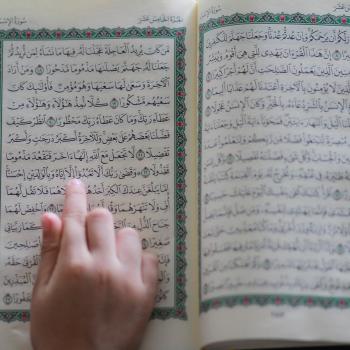Editors' Note: This article is part of the Patheos Public Square on Faith and the Election. Read other perspectives here.
Garrison Keillor says the unwholesome things are necessary to storytelling. We need the bad guy slain by the hero, the nail-biter to end in triumph, the lost soldier rescued with a kiss from his beloved. The story needs an antagonist who is capable of binding victory with defeat. From the American Revolution to Apollo 13, our collective story told is one full of the good guys who win.
For Christians, it is something deeper. We rightly believe that the life of the one who follows the Almighty is a life lived in the story written once and told in aeternum. The great story is told through both darkness and light and it is told in the work of human hands.
I must admit to weariness in being present in the political process, smack in the middle of this story unsure which is darkness and which is light. It is loud, much too loud, and the road to a more perfect union is littered with vice. It has felt too much to take in these national conversations that feel more like "who you hate I will hate, where you bomb I will bomb, and you will be my God" than they should. My frustrations this election season aren't solely about the candidates in the field. It seems the electorate grandstands themselves squarely into one of two camps: make Christ king in the polis or renounce the place of Christ in the public sphere all together. Those words aren't spoken, of course, but there seems to be little daylight between either making the Bible the official book of the state or forbidding the Little Sisters of the Poor to follow their faith.
Christ, and his followers, absolutely have a place in the public square, though we cannot set out to elect him. For one, the mission of Christ and his holy, triumphant Church does not fully share a mission with the United States. They overlap at times when we rescue the captured, liberate the oppressed, and enshrine in our law the dignity of man. The mission of Christ is eternal. It is a perfect union not founded with our sin-stained feet, but founded on the blood of the cross. The mission of the electorate, of a government, of this government, is transient: every two years it changes, every proposed law can alter its mission, every person who steps into its story can turn it on a dime.
We cannot elect Christ because we are called to model Christ. The last shall be first, the least the greatest; the scriptures give us lessons of this charge. Conversely, our government is about power, and we remember that power itself is neither good nor bad, but is wielded by whomever grasps it. Every four years we gather together, perhaps first in our chosen political parties, on the first Tuesday after the first Monday in November and we declare our intent for who should direct the power, the full faith and credit, of the most powerful nation on Earth. We choose the main character in the next chapter of the story.
Government is, at its core, a mechanism. The people we elect or appoint to serve in its co-equal branches are tools of that mechanism. If it sounds cold, maybe it should. Government is a cold liberator whose salvation lasts but a moment precisely because it is temporal, secular and should be. I'm not suggesting a stepping out of this cold process, a process riddled with every potential to corrupt the soul. Christians are called into the fray, not to permanently retreat from it.
That leaves two alternatives:
It is too easy to say "we don't elect a preacher-in-chief." That lets us off the hook for the morality, the character, and even the development of the soul who finds his, or her, home in the Oval Office. It is also too simple, and often dangerous, to declare the opposite and seek out a president who is the mirror to our closely-held values, cultures, and beliefs.
What, then, is the obligation of the Christ-follower and voter in an election, the role of faith in politics? Scrutiny. The word's etymology gives us a beautiful and stark image: those who search for something of value in the broken, discarded piles of rubbish. The choices in the political process can be stark. They can be easy. Or they can be terrifyingly difficult.
Scrutiny calls us to something different than simply the idea that we make a coin-flipped choice. Scrutiny calls us to search through the noise and find something of value. Scrutiny asks of us to get into the heaps and heaps of what is broken. It does not ask us to burn it all down. It does not require of us to weigh the whole story, or chapter, but to pick up each statement, each proposed law, each surrogate's speech and look for what is of value to hold. Scrutiny asks us to remain, with mercy in the story of course, but to remain.




